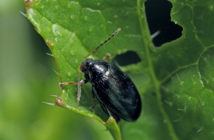Half of the fertiliser used on UK wheat crops could be removed, without yield or quality penalties, if a unique combination of nitrogen-capturing technologies is successful in trials.
Under the Farming Innovation Programme, Defra has funded a £1m project to investigate the potential to create a foliar photocatalyst-and-endophyte prototype that can help cereal and oilseed crops fix their own nitrogen. The project, delivered through Innovate UK, promises not only to improve growers’ profit margin but also to reduce air pollution.
Crop Intellect heads up the six-partner project consortium, alongside the UK Agri-Tech Centre, Dyson Farming, Barworth Research, the Allerton Project and the University of Lincoln, aiming to deliver a novel approach to the UK’s crop nutrition space.
 “Known as R-Leaf, the photocatalyst is a specially processed titanium dioxide that uses daylight to capture and convert nitrogen oxides (NOx), known air pollutants, directly into crop-usable nitrates,” says Dr Apostolos Papadopoulos, founder of Crop Intellect and the project’s lead partner as R-Leaf developer and IP holder.
“Known as R-Leaf, the photocatalyst is a specially processed titanium dioxide that uses daylight to capture and convert nitrogen oxides (NOx), known air pollutants, directly into crop-usable nitrates,” says Dr Apostolos Papadopoulos, founder of Crop Intellect and the project’s lead partner as R-Leaf developer and IP holder.
“These small but continuous doses of nitrate add up to an average of 50kg N/ha during the growing season,” he explains. “Extensive independent trials have demonstrated R-Leaf’s positive impact on crop productivity, with a 6% yield increase seen in cereals. Data also shows that R-Leaf can decrease the need for synthetic nitrogen fertilisers by up to 25%.”
“In addition to converting pollutants (NOx) into nitrates, R-Leaf also breaks down nitrous oxide (N₂O), a damaging greenhouse gas (GHG) known to be 265 times more potent than CO₂, into benign nitrogen and oxygen.”
Farmers could utilise this technology to reduce their net GHG emissions, he says, making this a unique opportunity to help growers meet net-zero emission targets. The estimated effect of R-Leaf’s N₂O capture is 5.4 tonnes of CO₂ per hectare, per year. Eventually, farmers may also be able to monetise their climate-change mitigation from using the proposed technology.
Photocatalyst technology with endophytes
R-Leaf is already being used by UK farmers, supported by commercial distribution agreements, but recent experiments identified the opportunity to combine the photocatalyst technology with endophytes. These are certain species of bacteria that form symbiotic relationships with plants. Nitrogen-fixing endophytes capture atmospheric nitrogen, converting it into ammonia for supply to the plant, in exchange for organic carbon and other nutrients.
“When we used these two technologies together, in a ‘farm standard’ crop of wheat, we found what we believe to be a synergistic effect, with a 5% yield increase over and above the individual applications,” Dr Papadopoulos reveals.
“We estimate that by combining R-Leaf with an appropriate endophyte, we can reduce nitrogen usage in wheat by 50%. That’s potentially a £100/ha profit,” he says. It’s this ‘dream combination’ that the consortium seeks to collaboratively research and develop over the 24-month project.
Crop Intellect provides to the consortium a deep understanding on photocatalysis, crop nutrition and commercialisation. They will work closely with Barworth Research, experts in upscaling technologies from lab to field, to optimise the formulation of the R-Leaf/endophyte prototype. The University of Lincoln will lead the project’s efficacy testing under controlled conditions, using its specialist equipment for GHG and plant growth analysis.
Dyson Farming, the largest farming business in the UK, will work in tandem with the Allerton Project, specialists in evaluating environmental impacts on-farm, to conduct full field trials in this project. The UK Agri-Tech Centre will model the potential impacts of the product and engage with stakeholders to understand any barriers to adoption and future opportunities.
“Innovating to deliver sustainable fertiliser use involves collaborating to balance resource use, productivity and environmental stewardship,” says Dr Harry Langford, Head of Innovation – Sustainability at the UK Agri-Tech Centre.
“This project is the perfect example of this, aiming to reduce the biotic and abiotic challenges associated with synthetic nitrogen fertiliser by optimising a synergistic relationship between R-Leaf and endophytes.”
“By rigorously evaluating not just the agronomic effects of these technologies, but also the environmental, economic and technical impacts, benefits will be validated for both farmers and the wider food supply chain. Changing the mode and type of fertiliser application could have particularly positive benefits for soil health, enhancing nutrient transformations and reducing losses to the wider environment,” explains Dr Langford.
The project will last two years, completing in early 2026.




